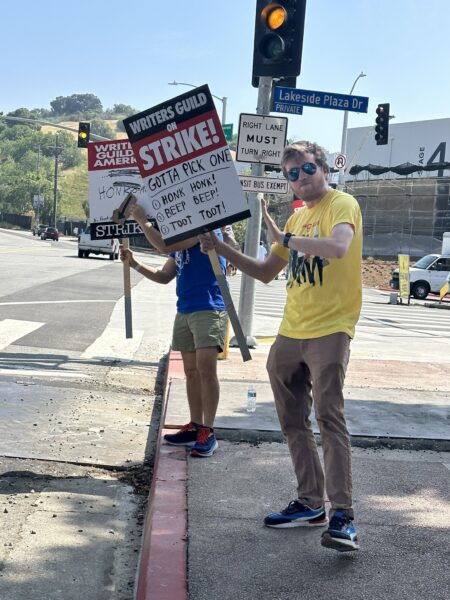Outside of the corporate offices and backlots of Netflix, Disney, NBC, Universal, and Warner Brothers, masses of protestors stand with signs that range from serious to hilarious, all with the same message: writers need to be fairly paid for their work.
Corporate media continues to twist public perception of the strike as members of the Writer’s Guild of America (WGA) enter their fourth week of acting against the strenuous conditions imposed upon them by the Alliance of Motion Picture and Television Producers (AMPTP). The strike is in response to the stagnant wages and the dismantling of stable pay structures within the industry, among many other issues.
Writing for the New Yorker, Michael Schulman explained the WGA’s grievances:
“Streamers are ordering shorter seasons, and the residuals model that used to give network writers a reliable income is out the window. The ladder from junior writer to showrunner has become murkier, with some people repeating steps like repeating grades, and others being flung to the top without the requisite experience, in order to meet demand for new content. Studios are cutting writing budgets to the bone by hiring fewer people for shorter time periods, often without paying for lower-level writers to be on set during production, which makes it all but impossible to learn the skills necessary to run a show.”
In short, the same amount of television is still being produced, but the time writers are being given and subsequently being paid to work on these shows has been cut severely, resulting in overworked, underpaid people.

Famous actors Bob Odenkirk and Mandy Patinkin show their solidarity with the WGA. (Mandy Patinkin via Twitter)
With the problem extending further than TV, it has become clear that writers of your favorite entertainment media can barely afford to make ends meet.
Many working writers living in Los Angeles are not living the imagined lifestyle of the “Hollywood Elite.” The strike has elicited a flood of writers sharing their stories of financial struggle — something that has become more common among those working in the film industry, as the average writer’s pay has fallen dramatically in the past decade.
“I’m currently walking two dogs for $30 per day on a route that takes me through Hollywood and past a billboard for the hit comedy I most recently wrote on,” wrote Jeanie Bergen, executive story editor on the hit TV show “Dave.”
The major Hollywood trades such as Variety, Deadline, and The Hollywood Reporter — all corporate-owned news outlets — have received a barrage of criticism from writers due to their biased headlines and reporting, which place blame on the writers and the WGA for the strike and halted productions. This is not surprising, as the parent companies of these highly popular news outlets have stakes in the production companies that are affected by the strike.

Strikers encourage passersby to honk ti disrupt film shoots and corporate meetings. (Travis Helwig via Twitter)
Accurate framing is crucial to dispel the perception of the striking writers as elites demanding more money for less work, and to illustrate that these writers aren’t suffering at the hands of supposedly unjust union leaders.
The writers’ strike happening right now matters in a larger context. Members of the WGA are fighting for their rights as unionized workers. They are fighting for issues that affect the majority of working Americans, such as the right to a living wage.
As more and more union efforts across the United States are thwarted by the rich and powerful, it is vital for American citizen to the see the power that comes from organizing. Labor action in one industry means labor action is possible in every industry.
On the writers’ strike, Richard D. Wolff, founder of Democracy at Work, commented, “When unions band together and with their allies across society, political power from below becomes real.”
Header Image via David McNew—Getty Images

